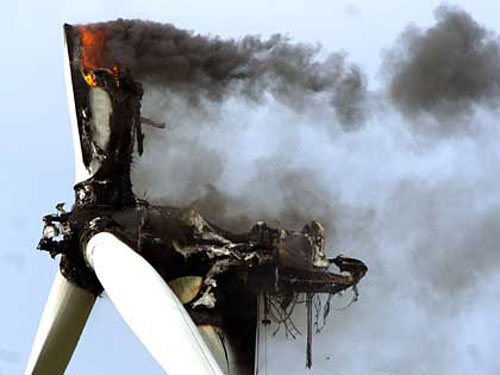
Germany and Switzerland: Short-Sighted Political Decisions; Long-Term Penalties
July 21, 2011
Four days after the events at Fukushima, Germany shut down seven of its older nuclear stations, essentially all those built before 1980. The current plan is to have all units shut down and abandoned by 2020. Nuclear power currently provides about 25% of Germany’s electricity needs, the rest being produced by fossil power plants and alternative/renewable energy projects (wind, solar, biomass) that are heavily subsidized because they are not profitable. The government’s solution is to purchase nuclear-generated electricity from France, increase purchases of natural gas from Russia and build more money-losing alternate energy projects.
German turbine fire - Der Spiegel.
Switzerland is also moving toward abandoning nuclear power, which provides 40% of the country’s electricity. Unlike Germany, Switzerland has no natural resources other than mountains and water, which is why it became a total electric country following World War I. All of Switzerland’s railroads run on electricity, a strategic decision made because the country lacks indigenous sources of coal, oil, or natural gas and must rely on importing fuel from its neighbors, all of whom have had a proclivity to go to war with each other throughout history. The intent of this article is not to underplay the seriousness or consequences of the Fukushima Daiichi accident. There is a major effort underway here in the U.S. to determine how our nuclear plants are prepared for a disaster such as befell Japan on March 11. However, the U.S. did have one advantage over Japan and the rest of the world; we began making preparations for disasters similar to Fukushima in 2011 following the September 11th terrorist attacks. What we found is that we are in good shape to handle both natural and “man-caused” disasters. The short-sighted political expediency of declaring nuclear energy no longer a viable option for meeting a country’s energy needs will have long-term effects on future generations in those countries. At some point, their economies will be so stagnant that citizens will have little else to do but sit and watch the windmills turn.
Biography Contact Bob Ciminel: bobciminel@yahoo.com
Publish A Letter in SitNews Read Letters/Opinions
|
||
